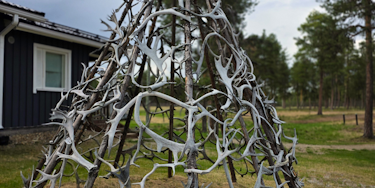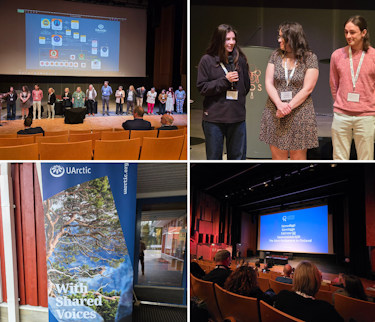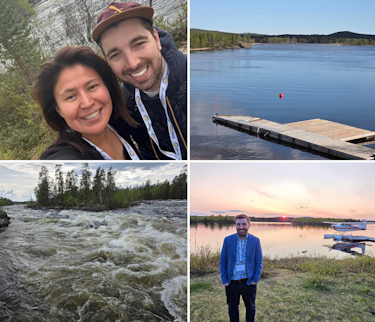Upcoming events
Stay informed about our upcoming activities at the College and in the community.
Free
Our cookies and those of our partners help improve your experience and analyze your use of the website. To learn all about cookies, check our privacy policy

In early June, Patrick Arsenault, Executive Director of Collège Nordique, travelled to Finland to attend the annual assembly of the University of the Arctic (UArctic), an international network that brings together educational institutions, researchers, and decision-makers committed to the future of circumpolar regions. He was accompanied by Camilia Zoe-Chocolate, Tłı̨chǫ language instructor at Collège Nordique, whose presence strengthened the linguistic and cultural impact of the delegation. This trip reflected a clear intention: to ensure that the voices of Francophones in Canada’s North are heard in conversations shaping the Arctic of today and tomorrow.
“For us, it was essential to fully embrace our role as a UArctic member, and to remind others that linguistic and cultural minority realities must be part of these international discussions,” explains Patrick Arsenault.
One of the key moments of his participation was his speech during the plenary session, where he highlighted the official accreditation of Collège Nordique. He took the opportunity to thank network members for their support while showcasing the institution’s recent progress. It was a concrete opportunity to reaffirm the College’s presence within the network and to underline the work being accomplished in the North.

But this trip was about more than representation. It marked the beginning of a promising initiative: the idea of creating a new thematic network within UArctic, focused on minority or fragile languages and cultures in northern contexts. The idea quickly resonated with several institutions. One of the most meaningful conversations on the topic took place with Professor Daniel Chartier (UQAM), holder of the UArctic Chair in Northern, Winter, and Arctic Imagination.
“Thanks to him, I now better understand the key steps to establishing a thematic network. He recommended starting conversations or events as early as this fall, even if the network isn’t official yet. That would strengthen our application — and we plan to follow his advice,” says Patrick.
Together, they also reflected on the terminology used in the project. The term “minority” was questioned and refined to reflect “fragile” languages or cultures. Professor Chartier also shared several inspiring northern-focused initiatives, including an exchange program between UQAM and a university in Norway.
“Linguistic diversity is one of the North’s greatest strengths, yet it remains too often absent from international conversations. By creating a space for dialogue and collaboration on these issues, we aim to equip our communities and build bridges between knowledge systems, practices, and territories,” Patrick adds.
The future network would also help bring together dispersed practices.
“There are wonderful initiatives happening in different parts of the world — around Gaelic, Swedish, French, or Indigenous languages — but we often don’t know what others are doing. Here at the College, our collaborations with the Tłı̨chǫ Government have shown us how much further we can go when we work together. Imagining something similar at an international level feels like a natural and truly inspiring next step.”
The next phase will begin this fall, with informal exchanges and a few pilot initiatives led by interested partners. The goal remains to submit a formal network proposal in February.
For Patrick Arsenault, this mission confirms that Collège Nordique is well positioned to play a leadership role.
“Yes, we’re taking the lead. We’re positioning ourselves as a key player when it comes to minority or fragile languages and cultures in northern contexts. It’s also symbolically significant that a Canadian institution is leading this, given Canada’s bilingualism and the continued vitality of so many Indigenous languages.”
Finally, he emphasizes the importance of collaboration in low-population regions.
“We absolutely need to work together. It would be a mistake to think our languages, cultures, and realities must be defended in isolation.”

Loading
Thank you for subscribing